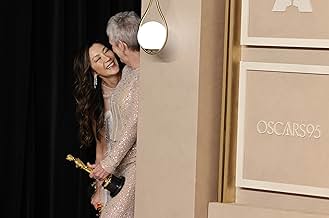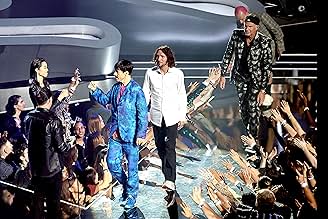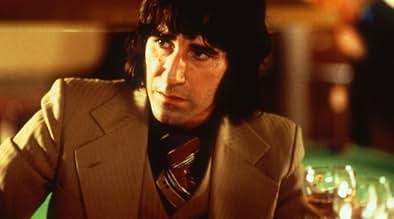Pulling no punches in its depiction of soccer legend George Best's slow descent from the heights of his Manchester United career, the man once dubbed the fifth Beatle for his glamorous lifes... Read allPulling no punches in its depiction of soccer legend George Best's slow descent from the heights of his Manchester United career, the man once dubbed the fifth Beatle for his glamorous lifestyle and good looks.Pulling no punches in its depiction of soccer legend George Best's slow descent from the heights of his Manchester United career, the man once dubbed the fifth Beatle for his glamorous lifestyle and good looks.
- Awards
- 2 wins total
- Director
- Writers
- All cast & crew
- Production, box office & more at IMDbPro
Storyline
Did you know
- TriviaPatsy Kensit, who plays Anna, is one of the housemates in Big Brother (UK) along with Callum Best, George Best's real life son.
- SoundtracksLong Black Limousine
Performed by Blues & Grooves with The 'Power Play' Horns
Featured review
There are two big problems with this 2000 film, as viewed in 2013. One is that the life story of George Best (1946 - 2005) is now complete and that the final years (liver disease, sobriety, transplant, relapse into alcohol, death and national outpouring of grief) must be covered in any Bestie biopic.
The other is the casting of John Lynch as Best. Although he is reasonable as the saddened boozed-up older Best at the start and end of the film, the same actor cannot be used as the teenage phenomenon who burst onto the scene in the early 1960s and created the blueprint for the 'pop star' footballer, using his charm and good looks to endorse products (yes he did advertise sausages), open shops and do modelling.
With those two points out of the way, and they are substantial, the rest of the film isn't too bad. I liked the contemporary music (Good Vibrations, Green Onions, In a Broken Dream) but Cockney Rebel was a strange choice for the Northern Irishman. Maybe a bit of Thin Lizzie's Whiskey in the Jar would have suited better for the end credits. The major achievements of his career (1966 v Benfica, 1968 European Cup) are highlighted, though there's no mention of the league title they won in 1967. The almost equally famous team-mates Bobby Charlton, Denis Law, Nobby Stiles, Paddy Crerand are there, even though Tony Dunne appears to have lost his first name. The important father figures of Matt Busby and real dad Dickie Best are there too.
Linus Roche is particularly good as the practical joking Denis Law though Jerome Flynn not as good as hypochondriac Bobby Charlton. Patsy Kensit is surprisingly wooden as, I assume, a random girlfriend. Stephen Fry is another National Treasure but that doesn't mean that he should be shoehorned into every British film, nor that a film is necessarily improved by his inclusion.
This film really lost its way about fifty minutes in. The pace really slowed and it became difficult to watch. Did we really need to see stupid drunken conversations with his mates? However, it was good to see him put six goals past Northampton after a six-week lay-off. That did really happen, though the primal scream that follows in the film did not.
Where was Angie Best in all this? The American years? The international matches? The attempted come-backs at Fulham, Bournemouth, Stockport and Hibs? And the conversation with the deceased Matt Busby - oh dear! Overall, there needs to be a decent movie about George but this isn't it.
The other is the casting of John Lynch as Best. Although he is reasonable as the saddened boozed-up older Best at the start and end of the film, the same actor cannot be used as the teenage phenomenon who burst onto the scene in the early 1960s and created the blueprint for the 'pop star' footballer, using his charm and good looks to endorse products (yes he did advertise sausages), open shops and do modelling.
With those two points out of the way, and they are substantial, the rest of the film isn't too bad. I liked the contemporary music (Good Vibrations, Green Onions, In a Broken Dream) but Cockney Rebel was a strange choice for the Northern Irishman. Maybe a bit of Thin Lizzie's Whiskey in the Jar would have suited better for the end credits. The major achievements of his career (1966 v Benfica, 1968 European Cup) are highlighted, though there's no mention of the league title they won in 1967. The almost equally famous team-mates Bobby Charlton, Denis Law, Nobby Stiles, Paddy Crerand are there, even though Tony Dunne appears to have lost his first name. The important father figures of Matt Busby and real dad Dickie Best are there too.
Linus Roche is particularly good as the practical joking Denis Law though Jerome Flynn not as good as hypochondriac Bobby Charlton. Patsy Kensit is surprisingly wooden as, I assume, a random girlfriend. Stephen Fry is another National Treasure but that doesn't mean that he should be shoehorned into every British film, nor that a film is necessarily improved by his inclusion.
This film really lost its way about fifty minutes in. The pace really slowed and it became difficult to watch. Did we really need to see stupid drunken conversations with his mates? However, it was good to see him put six goals past Northampton after a six-week lay-off. That did really happen, though the primal scream that follows in the film did not.
Where was Angie Best in all this? The American years? The international matches? The attempted come-backs at Fulham, Bournemouth, Stockport and Hibs? And the conversation with the deceased Matt Busby - oh dear! Overall, there needs to be a decent movie about George but this isn't it.
- How long is Best?Powered by Alexa
Details
- Release date
- Country of origin
- Official site
- Language
- Also known as
- Бест
- Filming locations
- Production companies
- See more company credits at IMDbPro
- Runtime1 hour 42 minutes
- Sound mix
Contribute to this page
Suggest an edit or add missing content



































